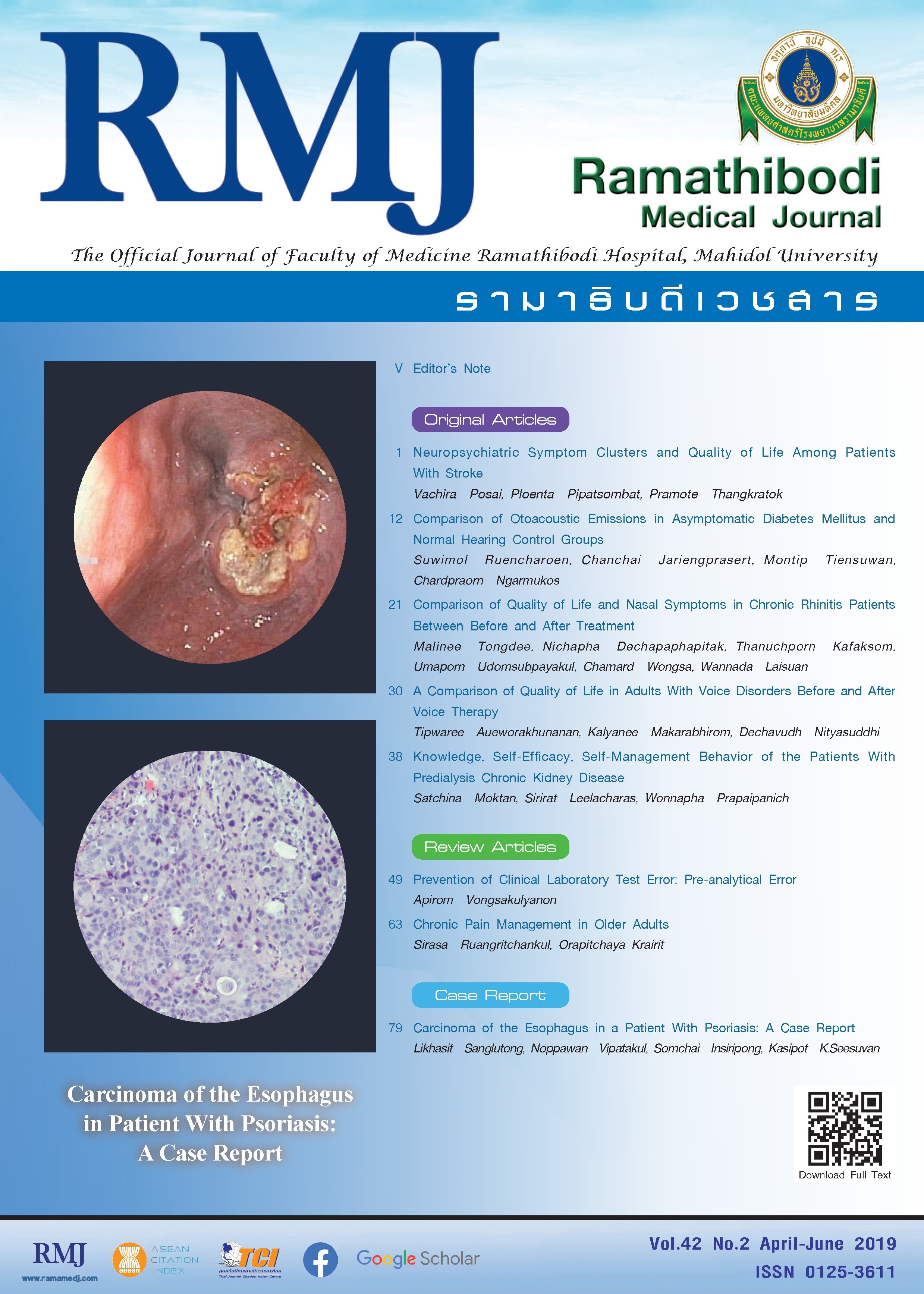Neuropsychiatric Symptom Clusters and Quality of Life Among Patients With Stroke
Main Article Content
Abstract
Background: There are relatively few reports of neuropsychiatric symptom clusters which affect the quality of life in patients with stroke.
Objective: To study neuropsychiatric symptom clusters and the relationship between neuropsychiatric symptom clusters and quality of life among patients with stroke.
Methods: This descriptive study conducted in 140 patients with stroke at Sanpasithiprasong Hospital, Ubon Ratchathani, Thailand; they were selected purposively. Data were collected through patient general and clinical information, the neuropsychiatric symptoms assessment, and the 12-item stroke-specific quality of life scale conducted from September 2018 to January 2019.
Results: The results illustrated that 12 neuropsychiatric symptoms of patients with stroke embraced 3 symptom clusters were psychosis clusters, behavioral problems clusters, and mood disturbance clusters. (average frequency = 1.58, 2.37, 2.49; and average severity = 2.08, 2.73, 2.82, respectively). Among 3 symptom clusters, psychosis (r = 0.289; P < .01), behavioral problems (r = 0.719; P < .01), and mood disturbance (r = 0.716; P < .01) clusters were statistically significantly associated with all aspects of quality of life.
Conclusions: This study showed that neuropsychiatric symptom, especially behavioral problems and mood disturbance clusters were correlated with quality of life among patients with stroke.
Article Details
References
Suwanwela NC. Stroke epidemiology in Thailand. J Stroke. 2014;16(1):1-7. doi:10.5853/jos.2014.16.1.1.
Thangkratok P. The role of the nurse in the chronic disease management. Songklanagarind J Nurs. 2017;37(2):154-159.
Jitnarin N, Kosulwat V, Rojroongwasinkul N, Boonpraderm A, Haddock CK, Poston WS. Risk factors for overweight and obesity among Thai adults: results of the National Thai Food Consumption Survey. Nutrients. 2010;2(1):60-74. doi:10.3390/nu20100060.
Angelelli P, Paolucci S, Bivona U, et al. Development of neuropsychiatric symptoms in poststroke patients: a cross-sectional study. Acta Psychiatr Scand. 2004;110(1):55-63. doi:10.1111/j.1600-0447.2004.00297.x.
Hachinski V, Iadecola C, Petersen RC, et al. National Institute of Neurological Disorders and Stroke-Canadian Stroke Network vascular cognitive impairment harmonization standards. Stroke. 2006;37(9):2220-2241. doi:10.1161/01.STR.0000237236.88823.47.
Cummings JL. The Neuropsychiatric Inventory: assessing psychopathology in dementia patients. Neurology. 1997;48(5 Suppl 6):S10-S16.
Wong A, Lau AYL, Yang J, et al. Neuropsychiatric symptom clusters in stroke and transient ischemic attack by cognitive status and stroke subtype: frequency and relationships with vascular lesions, brain atrophy and amyloid. PLoS One. 2016;11(9):e0162846. doi:10.1371/journal.pone.0162846.
Kaplan A. Neuropsychiatric symptoms in poststroke patients. Psychiatric Times. 2005;22(1):1.
Samus QM, Rosenblatt A, Onyike C, et al. Correlates of caregiver-rated quality of life in assisted living: the Maryland Assisted Living study. J Gerontol B Psychol Sci Soc Sci. 2006;61(5):P311-P314.
Royall DR, Lauterbach EC, Cummings JL, et al. Executive control function: a review of its promise and challenges for clinical research. A report from the Committee on Research of the American Neuropsychiatric Association. J Neuropsychiatry Clin Neurosci. 2002 Fall;14(4):377-405. doi:10.1176/jnp.14.4.377.
Hackett ML, Köhler S, O'Brien JT, Mead GE. Neuropsychiatric outcomes of stroke. Lancet Neurol. 2014;13(5):525-534. doi:10.1016/S1474-4422(14)70016-X.
Post MW, Boosman H, van Zandvoort MM, Passier PE, Rinkel GJ, Visser-Meily JM. Development and validation of a short version of the stroke specific quality of life scale. J Neurol Neurosurg Psychiatry. 2011;82(3):283-286. doi:10.1136/jnnp.2009.196394.
Kim JS, Choi-Kwon S. Poststroke depression and emotional incontinence: correlation with lesion location. Neurology. 2000;54(9):1805-1810. doi:10.1212/WNL.54.9.1805.
Carota A, Bogousslavsky J. Mood disorders after stroke. Front Neurol Neurosci. 2012;30:70-74. doi:10.1159/000333413.
Kim JS, Choi-Kwon S, Kwon SU, Lee HJ, Park KA, Seo YS. Factors affecting the quality of life after ischemic stroke: young versus old patients. J Clin Neurol. 2005;1(1):59-68. doi:10.3988/jcn.2005.1.1.59.
Choi-Kwon S, Kim HS, Kwon SU, Kim JS. Factors affecting the burden on caregivers of stroke survivors in South Korea. Arch Phys Med Rehabil. 2005;86(5):1043-1048. doi:10.1016/j.apmr.2004.09.013.
Liman TG, Heuschmann PU, Endres M, Floel A, Schwab S, Kolominsky-Rabas PL. Impact of low mini-mental status on health outcome up to 5 years after stroke: the Erlangen Stroke Project. J Neurol. 2012;259(6):1125-1130. doi:10.1007/s00415-011-6312-6.
Bundhamcharoen K, Odton P, Phulkerd S, Tangcharoensathien V. Burden of disease in Thailand: changes in health gap between 1999 and 2004. BMC Public Health. 2011;11:53. doi:10.1186/1471-2458-11-53.
Paradiso S, Robinson RG, Arndt S. Self-reported aggressive behavior in patients with stroke. J Nerv Ment Dis. 1996;184(12):746-753.
Kim JS, Choi S, Kwon SU, Seo YS. Inability to control anger or aggression after stroke. Neurology. 2002;58(7):1106-1108. doi:10.1212/WNL.58.7.1106.
Stone J, Townend E, Kwan J, Haga K, Dennis MS, Sharpe M. Personality change after stroke: some preliminary observations. J Neurol Neurosurg Psychiatry. 2004;75(12):1708-1713. doi:10.1136/jnnp.2004.037887.
Stangeland H, Orgeta V, Bell V. Poststroke psychosis: a systematic review. J Neurol Neurosurg Psychiatry. 2018;89(8):879-885. doi:10.1136/jnnp-2017-317327.




